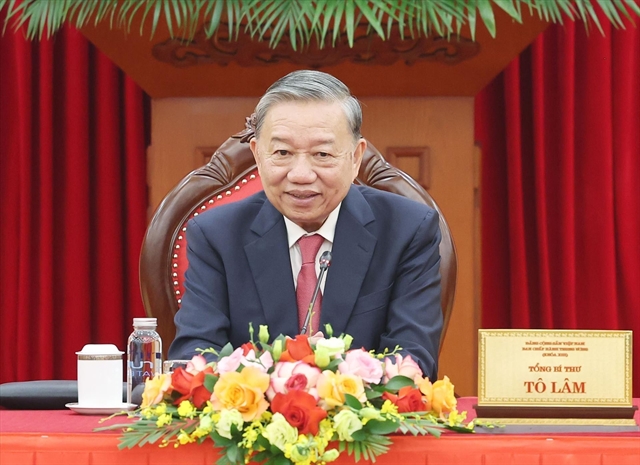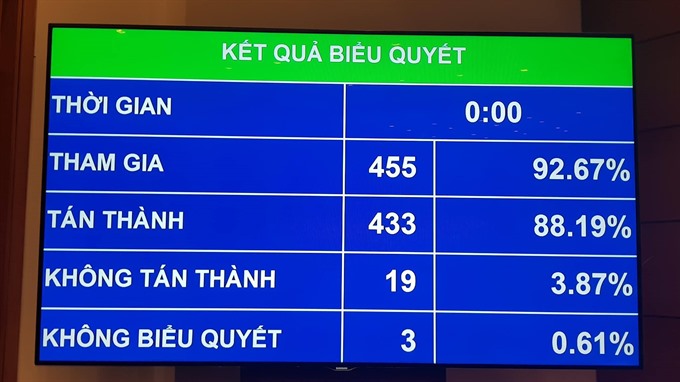 Politics & Law
Politics & Law

The National Assembly yesterday approved several important, long-awaited documents before wrapping its latest month-long session.
 |
| 88.19 per cent of National Assembly deputies voted in favour of the Law on Planning. — Photo cafebiz.vn |
HÀ NỘI — The National Assembly yesterday approved several important, long-awaited documents before wrapping its latest month-long session.
The first of these was the Law on Planning, for which 88.19 per cent of deputies voted in favour.
The law, some aspects of which raised a lot of controversy, had been discussed in previous sessions of the 14th NA and sparked heated debates.
It establishes a new system of national master plans and fundamental principles for planning work. It also defines tasks and powers of State authorities in planning activities and specifies the process from formulating to implementing and supervising implementation of the plans.
Planning, as defined in the law, is the arrangement and allocation of space for economic, cultural, defence, security and environmental activities in an identified area aiming to effectively utilise resources to reach sustainable development goals set by the State in a given period of time.
The system comprises of national planning, regional planning, provincial planning, special administrative - economic zone planning, and urban and rural area planning. National plans serve as the basis for formulating plans at lower levels.
The law stipulates that an agency empowered to decide and approve a certain plan has the right to adjust it without waiting for the nod from higher-level planners as long as planning at the higher levels are not affected.
This stipulation addresses concerns expressed by deputies and voters that uncontrolled adjustments at lower planning levels would affect higher-level consistency and effectiveness.
Another noteworthy point is that airspace and underground planning are not included in the national planning system as was suggested by some NA deputies. Explaining this before the NA voted on the law, Chairman of the NA’s Economic Committee, Vũ Hồng Thanh, said the planning of airspace and underground space was already incorporated in other kinds of planning in the system and did not require separate mention.
The new law will take effect on January 1, 2019.
HCM City autonomy
Another major document adopted was a resolution on piloting several mechanisms and policies for the development of HCM City.
The resolution won 93.7 per cent of the deputies’ vote.
The resolution grants greater autonomy to city authorities on specific policies for land management, investment, finance and State budget management, as well as incomes of public officials under the city’s management.
For example, the city People’s Council is allowed to impose certain fees not in the list of those regulated by the Government, or raise fees that have been decided upon by competent authorities.
The council can ask the Government to submit for approval from the National Assembly Standing Committee proposals on raising taxes or tax rates for some products over what is regulated by the Government.
The city can use 100 per cent of the additional budget revenues earned from these policy adjustments and 50 per cent of earnings from selling State property and land-attached property based on law to invest in socio-economic infrastructure.
HCM City is also allowed to enjoy revenues from privatising State-owned enterprises under the management of the city People’s Committee and divestment of State equity from economic entities in which the People’s Committee serves as the representative of State ownership.
The resolution takes effect on January 15, 2018 and will be valid for five years.
National Defence Law
Also on Friday, the NA deputies spent time to discuss a revised law on national defence with many emphasising the importance of combining national defence activities with economic and cultural activities.
Deputy Nguyễn Anh Trí of Hà Nội expressed support for the military to engage in economic activities, saying it was in conformity with the Party’s policies and the country’s Constitution.
National defence and the economy have intertwined relations, so doing business would help strengthen the military and be beneficial to the society as well, he said.
Major General Nguyễn Văn Khánh, a deputy of Bình Dương Province, said the military would not only do business in its “pure sense”, but focus on national defence economy business and developing science and technology for strengthening national defence capabilities.
Defence Minister General Ngô Xuân Lịch said that engagement in economic activities had always been an important function of the military and should be regulated in the revised law this time.
He said that over the past 70 years since the country gained independence, military business entities had done business in many regions that civil ones don’t invest in due to low profit.
Under the plan to restructure military businesses, the ministry would only maintain 100 per cent stake in 17 out of the current 88 businesses, he said. The rest would be subjected to divestment, privatisation and mergers and acquisitions, he said.
Deputies also discussed other issues including national emergencies, policies on national defence education, and curfew declarations.
NA Chair remarks
The fourth plenary session of the 14th NA concluded yesterday after 26 working days.
In her closing remarks, NA Chairwoman Nguyễn Thị Kim Ngân stressed that the NA deputies spent much time discussing socio-economic development and the State budget in 2017, the socio-economic development plan and State budget estimates and allocation for 2018, and the national three-year financial plan and State budget from 2018-20.
During the session, the NA pointed out shortcomings of some sectors, assessed both achievements and failures, analysed and forecasted risks and challenges the country will face, and urged the Government, ministries, agencies, sectors and localities to have breakthrough solutions and resolute management to meet targets.
The NA also approved resolutions on socio-economic development plan for 2018 and State budget estimate and allocation for 2018.
The NA also approved six laws that will influence national development in different fields, including planning, public debt management, restructuring of credit institutions for bad debt handling, forestry and fisheries development and foreign relations, Ngân said.
The NA discussed nine other draft laws to complete the legal system and ensure national defence and security. They also featured contents to ensure social order and safety, human rights, citizens’ rights and obligations and to prevent law violations, corruption and wastefulness, she said. These draft laws will continue to be studied to improve their quality before submission to the next NA session.
The NA Chairwoman urged ministries, agencies and localities to implement measures to enforce newly-approved laws and resolutions, continue assessing and drawing lessons from achievements and limitations, and renewing management tasks and improving operation efficiency.
Earlier the same day, the NA passed a resolution to continue reforming State administrative apparatus to make it streamlined and operate effectively with 94.5 per cent of legislators voting yes and a resolution on question-and-answer activities at the fourth session of the 14th NA with 93.89 per cent of deputies voting yes. — VNS